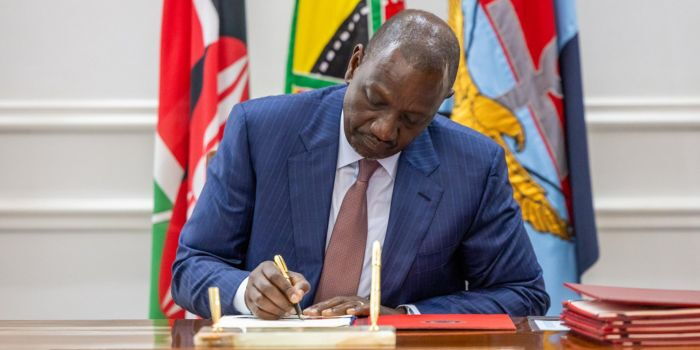Ruto Forms Special Panel to Speed Up Compensation for Protest Victims
Nairobi, Kenya – President William Ruto has established a Panel of Experts tasked with fast-tracking compensation for victims of demonstrations and public protests across the country. The move comes as part of a broader effort to address the grievances of citizens who have suffered injuries, property loss, or other harm during civic unrest.
The announcement was made official on Tuesday through a Gazette Notice, in which the President outlined the responsibilities of the new panel. According to the notice, the team will design and implement a comprehensive framework to identify, verify, and support affected individuals. This framework is intended to ensure that victims are treated fairly and that compensation reaches those who genuinely need it.
Composition of the Panel
The 15-member panel will be chaired by Professor Makau Mutua, Ruto’s Constitutional Advisor, who has extensive experience in human rights and constitutional law. Faith Odhiambo Mony, the President of the Law Society of Kenya (LSK), will serve as vice-chairperson, bringing her legal expertise to the oversight of the process.
Other members of the panel include:
- Kennedy N. Ogeto, former Solicitor General
- Dr Duncan Ojwang’, previously appointed to head the Kenya National Commission on Human Rights (KNCHR) but who had declined the position
- Naini Lankas
- Dr Francis Muraya
- Juliet Chepkemei
- Pius Metto
- Fatuma Kinsi Abass
- Raphael Anampiu
The panel will be supported by a technical team led by Richard Barno, with Dr Duncan A. Okelo Ndeda as Co-Technical Lead. Jerusah Mwaathime Michael and Dr Raphael Ng’etich will serve as joint secretaries, ensuring smooth administration and documentation.
Mandate and Responsibilities
The Gazette Notice outlines an extensive mandate for the panel. Its key responsibilities include:
- Developing a framework to verify and categorise victims, ensuring that those eligible for compensation are accurately identified.
- Authenticating data from trusted sources such as the Independent Policing Oversight Authority (IPOA), KNCHR, and the Ministry of Health.
- Recommending appropriate reparations, including financial compensation and other forms of support for victims and their families.
- Proposing prosecutions or accountability measures through the Office of the Director of Public Prosecutions (ODPP), where evidence points to wrongdoing.
The panel is also mandated to engage with families of victims, civil society organisations, faith-based institutions, and other stakeholders. These consultations are aimed at promoting a transparent and inclusive compensation process that reflects the needs and concerns of affected communities.
Powers and Duration
President Ruto has granted the panel legal powers to:
- Access information and records from any State organ or public office, within the limits of the law.
- Require individuals or institutions to provide information or documents relevant to the process.
The panel will serve for 120 days (four months) from the date of the Gazette Notice, though the term may be extended if necessary, ensuring adequate time to complete its mandate.
Funding and Accountability
Funding for the panel and the compensation process will be provided in accordance with the Public Finance Management Act and other relevant laws. The President emphasised that all payments must be made through auditable and transparent channels, reducing the risk of mismanagement of public funds.
The panel is expected to:
- Maintain comprehensive records to support independent audits.
- Publish anonymised statistics and regular progress reports to inform the public of its work.
Background: Protests and Need for Compensation
Kenya has in recent years experienced several demonstrations and public protests, many of which have led to injuries, loss of property, and in some cases, fatalities. Citizens and human rights groups have repeatedly called for government-led compensation and accountability for victims.
The establishment of this panel is seen as a step towards rebuilding public trust, ensuring that victims are recognised, and promoting accountability among public officials and law enforcement agencies. Analysts note that a transparent and well-managed compensation scheme could help reduce tensions and encourage peaceful civic engagement in the future.
Reactions and Expectations
Civil society groups and human rights advocates have welcomed the announcement, urging the panel to operate independently, transparently, and efficiently. Families of victims have expressed cautious optimism, hoping that this initiative will finally deliver justice and financial support to those affected by unrest.
Meanwhile, legal experts emphasise that the panel’s success will depend on effective coordination with institutions such as IPOA, KNCHR, and the ODPP, as well as its ability to maintain clear communication with the public.
President Ruto’s directive signals the government’s commitment to addressing the consequences of protests while promoting a fair and accountable system for victims.
With clear timelines, defined roles, and legal backing, the panel is expected to set a precedent for handling similar cases in the future.
Join Government Official WhatsApp Channel To Stay Updated On time
https://whatsapp.com/channel/0029VaWT5gSGufImU8R0DO30


